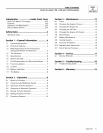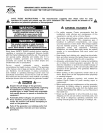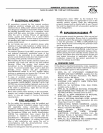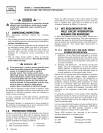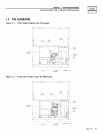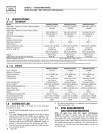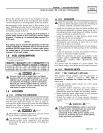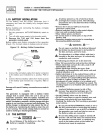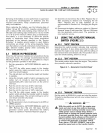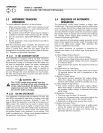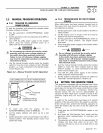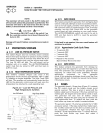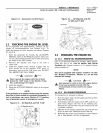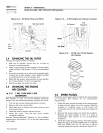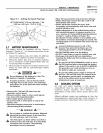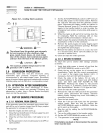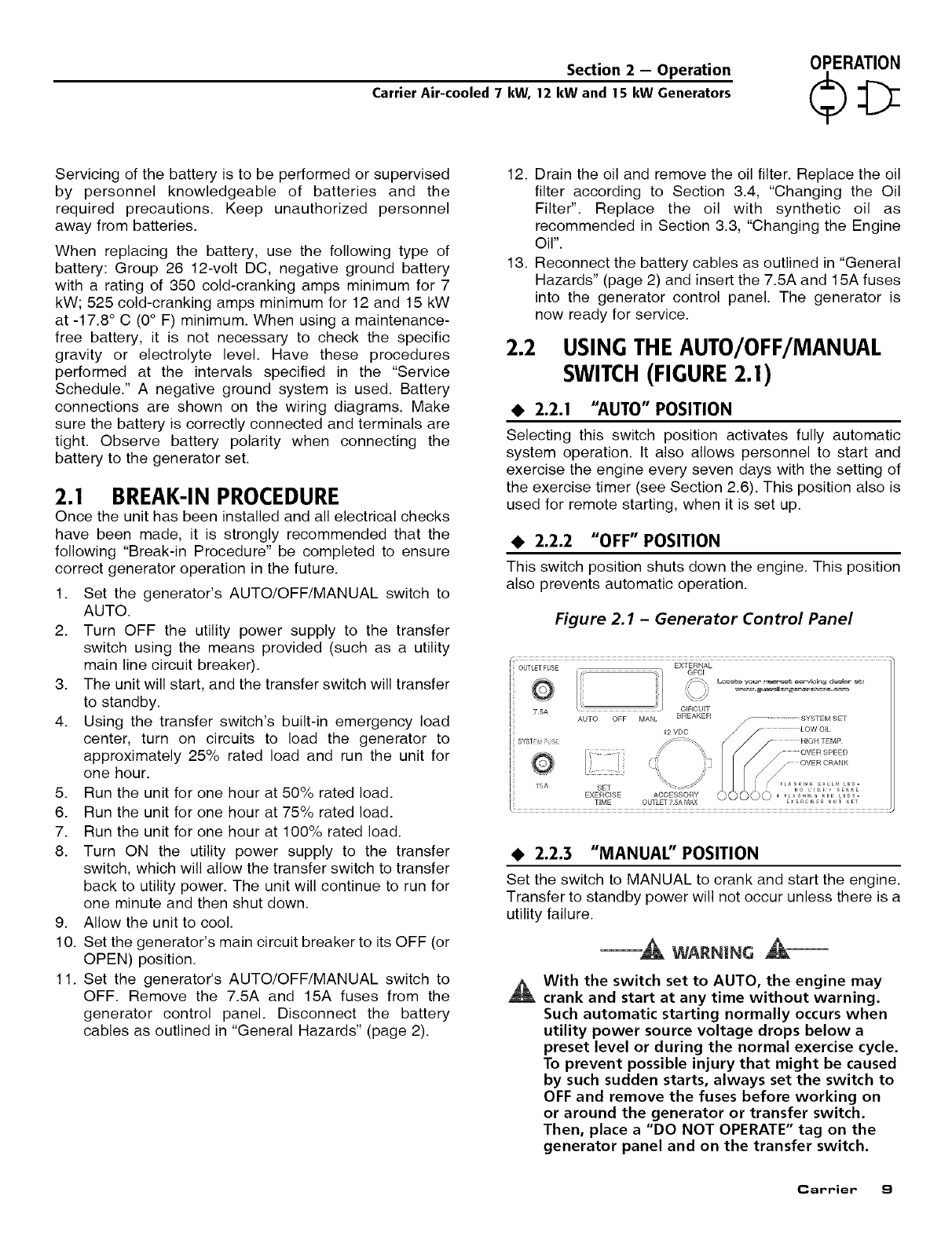
Section 2 -- Operation
Carrier Air-cooled 7 kW, 12 kW and 15 kW Generators
OPERATION
Servicing of the battery is to be performed or supervised
by personnel knowledgeable of batteries and the
required precautions. Keep unauthorized personnel
away from batteries.
When replacing the battery, use the following type of
battery: Group 26 12-volt DC, negative ground battery
with a rating of 350 cold-cranking amps minimum for 7
kW; 525 cold-cranking amps minimum for 12 and 15 kW
at-17.8 ° C (0° F) minimum. When using a maintenance-
free battery, it is not necessary to check the specific
gravity or electrolyte level. Have these procedures
performed at the intervals specified in the "Service
Schedule." A negative ground system is used. Battery
connections are shown on the wiring diagrams. Make
sure the battery is correctly connected and terminals are
tight. Observe battery polarity when connecting the
battery to the generator set.
2.1 BREAK-IN PROCEDURE
Once the unit has been installed and all electrical checks
have been made, it is strongly recommended that the
following "Break-in Procedure" be completed to ensure
correct generator operation in the future.
1. Set the generator's AUTO/OFF/MANUAL switch to
AUTO.
2. Turn OFF the utility power supply to the transfer
switch using the means provided (such as a utility
main line circuit breaker).
3. The unit will start, and the transfer switch will transfer
to standby.
4. Using the transfer switch's built-in emergency load
center, turn on circuits to load the generator to
approximately 25% rated load and run the unit for
one hour.
5. Run the unit for one hour at 50% rated load.
6. Run the unit for one hour at 75% rated load.
7. Run the unit for one hour at 100% rated load.
8. Turn ON the utility power supply to the transfer
switch, which will allow the transfer switch to transfer
back to utility power. The unit will continue to run for
one minute and then shut down.
9. Allow the unit to cool.
10. Set the generator's main circuit breaker to its OFF (or
OPEN) position.
11. Set the generator's AUTO/OFF/MANUAL switch to
OFF. Remove the 7.5A and 15A fuses from the
generator control panel. Disconnect the battery
cables as outlined in "General Hazards" (page 2).
12. Drain the oil and remove the oil filter. Replace the oil
filter according to Section 3.4, "Changing the Oil
Filter". Replace the oil with synthetic oil as
recommended in Section 3.3, "Changing the Engine
Oil".
13. Reconnect the battery cables as outlined in "General
Hazards" (page 2) and insert the 7.5A and 15A fuses
into the generator control panel. The generator is
now ready for service.
2.2 USING THE AUTO/OFF/MANUAL
SWITCH (FIGURE 2.1)
2.2.1 "AUTO" POSITION
Selecting this switch position activates fully automatic
system operation. It also allows personnel to start and
exercise the engine every seven days with the setting of
the exercise timer (see Section 2.6). This position also is
used for remote starting, when it is set up.
2.2.2 "OFF" POSITION
This switch position shuts down the engine. This position
also prevents automatic operation.
Figure 2.1 - Generator Control Panel
2.2.3 "MANUAL" POSITION
Set the switch to MANUAL to crank and start the engine.
Transfer to standby power will not occur unless there is a
utility failure.
°_ WARNING _=
With the switch set to AUTO, the engine may
crank and start at any time without warning.
Such automatic starting normally occurs when
utility power source voltage drops below a
preset level or during the normal exercise cycle.
To prevent possible injury that might be caused
by such sudden starts, always set the switch to
OFF and remove the fuses before working on
or around the generator or transfer switch.
Then, place a "DO NOT OPERATE" tag on the
generator panel and on the transfer switch.
Carrier 9



